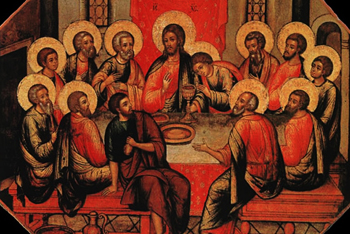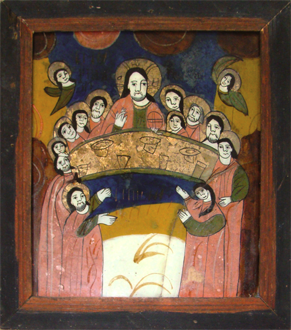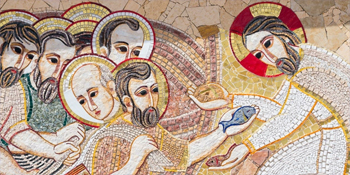For Sunday August 29, 2021
Lectionary Readings (Revised Common Lectionary, Year B)
Deuteronomy 4:1-2, 6-9
Psalm 15
James 1:17-27
Mark 7:1-8, 14-15, 21-23
My husband and I just spent two weeks in Greece, visiting some of the ancient sacred sites we’ve always wanted to see. We stood on the Areopagus, the hilltop where St. Paul preached his famous sermon, decrying the "unknown God." We toured the mammoth ruins of the Acropolis, walked the Sacred Way in Delphi, explored what remains of the Sanctuary of Asclepius in Epidaurus, and admired the gorgeous icons, frescoes, and illuminated manuscripts now housed at the Byzantine and Christian Museum in Athens.
It was impossible to immerse ourselves in this rich and colorful history without noting how persistent, fervent, and complicated humanity’s pursuit of the sacred has always been. In the name of the divine, we have created some of the most breathtaking art, architecture, literature, liturgy, ritual, and rite imaginable. We've healed, housed, fed, loved, and served each other. Also in the name of the divine, we have impoverished, tortured, colonized, enslaved, and decimated each other. We’ve murdered each other’s children, forced “nonbelievers” to choose between conversion and death, and burned each other’s houses of worship to the ground.
In short, our relentless desire to seek, serve, appease, or placate the sacred has never been a benign thing. Religion has always had the power to elevate or ruin us. To make us compassionate and creative, or stingy and small-minded. To grant us peace, or stir us to war. If our past teaches us anything, it is that we dare not treat our pursuit of God casually; the stakes are too high. What we profess and practice when it comes to religion really, really matters.
 |
In our Gospel reading this week, Jesus confronts a group of Pharisees who accuse his disciples of getting religion wrong. Specifically, the Pharisees ask why some of Jesus’s followers eat their meals with “defiled hands” — that is, why they eat without performing the ritual hand washing expected of observant Jewish people before meals.
To our contemporary ears, the accusation might sound trivial. But the Pharisees ask an important question, a question that gets to the heart of what authentic religion is. Consider their context: the first century Jewish people among whom Jesus ministers is an oppressed minority, living in an occupied land. How are they to keep their faith viable against the backdrop of colonization? In the midst of religious and cultural diversity, how should they maintain their identity? Their integrity? Their heritage?
The Pharisees’ solution to the problem is to contain and codify the sacred. How can God’s people best practice their religion among the surrounding pagans? They can create and maintain a purity culture — a culture that clearly delineates who is “in” and who is “out,” who is clean and who is unclean, who deserves God’s favor and who doesn’t. They can practice the ancient rituals of their elders down to the last letter, as if tradition itself is the gateway to holiness. They can refuse table fellowship with the "unwashed" — the tax collectors, sex workers, and other morally compromised sinners. They can set themselves apart as God’s righteous and holy people.
This is religion as fence-building. Religion as separation. Religion as institution for institution's sake. And Jesus — never one to mince words — calls it what it is. Quoting the prophet Isaiah, he rebukes the Pharisees, saying, “This people honors me with their lips, but their hearts are far from me; in vain do they worship me, teaching human precepts as doctrines.”
 |
It’s important to note that Jesus doesn't condemn ritual hand washing in this story. He doesn't argue that all religious traditions are evil. What he indicts is the legalism, self-righteousness, and exclusivism that keeps the Pharisees from freely loving God and loving their neighbors. What he calls out is their elevation of rite over mercy, heritage over hospitality, ritual over compassion. What he grieves is the Pharisees’ compulsive need to police the boundaries of their religion, based on their own narrow definitions of purity and piety.
Again, it’s easy for us to look down on the Pharisees, as if we in our enlightened modernity would never make their mistakes. But honestly, are we any different? Don’t we sometimes behave as if we’re finished products, with nothing new to discover about the Holy Spirit’s movements in the world? Don’t we cling to spiritual traditions and practices that long ago ceased to be life-giving, simply because we can’t bear to change “the way we’ve always done things?” Don’t we set up religious litmus tests for each other, and decide who’s in and who’s out based on conditions that have nothing to do with Jesus’s open-hearted love and hospitality? Don’t we fixate on the forms of piety we can put on display for others to applaud, instead of cultivating the secret and hidden life of God deep within our souls?
Don’t we allow our cherished rituals to ossify, not noticing that our hearts, too, are becoming rigid and fixed, complacent and cold? As we engage in the business of church-hopping, churchgoing, and church-building, don’t we sometimes forget that true religion is inclusive and welcoming, open-handed and open-hearted? Don't we skirt around the basic truth that authentic religion is love of God and love of neighbor?
It doesn’t matter what specific forms our legalism takes. In some churches, it centers around liturgy or preaching styles. In others, it comes down to deifying one genre of music over another. In still others, it means policing the political affiliations and allegiances of parishioners. In some faith communities, the lines in the sand have to do with women clergy, or gay marriage, or racial justice, or economic equality. The guises vary, but in the end, legalism in any guise deadens us towards God and towards our neighbors. It freezes us in time, making us irrelevant to the generations that come after us. It makes us stingy and small-minded, cowardly and anxious. It strips away our joy and robs us of peace. It causes us, in Jesus’s chilling words, to “honor God with our lips” but to “worship him in vain.”
 |
So what can we do? How can we discern whether our way of doing religion is life-giving or not? Jesus gives his listeners this advice: notice what comes out of you. Notice what fruit your adherence to tradition bears. Does your version of holiness lead to hospitality? To inclusion? To freedom? Does it cause your heart to open wide with compassion? Does it lead other people to feel loved and welcomed at God’s table? Does it make you brave, creative, and joyful? Does it prepare your mind and body for a God who is always doing something fresh and new? Does it facilitate another step forward in your spiritual evolution?
Or does it make you small, stingy, and bored? Fearful, suspicious, withholding, and judgmental?
Like everything else Jesus offers us, his confrontation with the Pharisees is an invitation. It’s an invitation to consider what is really sacred and inviolable in our spiritual lives. It’s an invitation to go deeper — past lip service, past tradition, past purity, past piety. It’s an invitation to practice what this week’s epistle calls “pure religion.” A religion of love for the widow, the orphan, the stranger, the outcast, and the enemy. A religion of trust in a surprising, innovating, and ever-creating God. The God of heritage and history, yes. But also the God of an ever-living, ever-changing now.
Debie Thomas: debie.thomas1@gmail.com
Image credits: (1) The Catalog of Good Deeds; (2) The Australian Institute for Orthodox Christian Studies; and (3) Aleteia.





